Sunny - Hi 74 Lo 54 for Northern KY, USA
Song of the week: Protect My Child, Susan Tedeschi
Ramble:
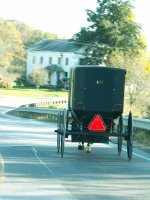 Like so many others, I am still shocked and saddened by the cruel, vicious, and calculated murders of the young innocent Amish girls from Pennsylvania. There are no words that can remove the horrible images; There are no words that can offer comfort; Nor are there words to remove the awful hole it has left in our hearts. To think that someone is so consumed with that much anger and hatred is beyond my comprehension.
Like so many others, I am still shocked and saddened by the cruel, vicious, and calculated murders of the young innocent Amish girls from Pennsylvania. There are no words that can remove the horrible images; There are no words that can offer comfort; Nor are there words to remove the awful hole it has left in our hearts. To think that someone is so consumed with that much anger and hatred is beyond my comprehension.The Amish community has always fascinated me. I think I became cognizant of them years ago at the Dayton Airshow. Folks that have none of the modern conveniences at an airshow--- looking at modern technology. I suppose they find modern technology just as interesting as I find their lifestyle interesting. I even envy them- their tenacity, the simple, yet hard lives they choose to lead. It is uncomplicated by things that you and I can now not live without...
My prayers go to the Amish Community in Pennsylvania.
..:::..
Saturday, Michael and I drove down to Perryville, Kentucky... about 3 hours south of us. We went to our very first Civil War Re-enactment- The Battle of Perryville took place on October 8, 1862.
The Battle of Perryville, also known as Battle at Perryville and Battle of Chaplin Hills, was an important but largely neglected encounter in the American Civil War. It was fought on October 8, 1862, in the Chaplin Hills west of Perryville, Kentucky. The battle began with a middle-of-the-night skirmish over a source of precious drinking water, and ended more or less by default with the onset of darkness and the retreat of the tactical victor, the Confederates. It marked the end of the Kentucky Campaign of Confederate Generals Braxton Bragg and Edmund Kirby Smith and, like the campaign, was marked not only by fierce fighting and heroic achievement, but also by indecision, confusion, and futility on both sides:
It involved one general (Bragg) whose charges would not initially carry out his orders to attack, and another (Union Major General Don Carlos Buell) who did not intend to fight until the following day. Unaware that the battle had begun until it was nearly over, Buell kept more than half his troops aside while the rest fought for their lives.
It pitted a force of superior numbers (the Union Army of the Ohio), which included troops so green they did not know how to properly aim their artillery, against veteran soldiers (the Confederate Army of Mississippi) whose commander had badly misjudged the size of their opposition.
With little direction from their commanders, the soldiers engaged in what some insisted was the most ferocious fighting of the entire war. Following the battle, and for the rest of their lives, both generals were condemned for their poor leadership and mismanagement of their forces.
The Confederates won a tactical victory by pushing most of the Union forces back from the strategic high ground and sources of water over which they fought, but they immediately abandoned the land they had gained at such a high price when they realized they had been opposed by less than half of the Union troops in the area.
The Confederate "victory" marked the end of their last offensive campaign in the West, and their retreat left the border state of Kentucky under the control of the Union Army for the rest of the war.
information taken directly from Wikipedia.
Both sides suffered heavily. The Union had 845 dead, 2851 wounded and 515 missing (total of 4,211) out of perhaps 22,000 men engaged in the fighting. The Confederates had 510 dead, 2635 wounded and 251 missing (total of 3,396) out of a total of 16,000 men.
Below are the photos I took yesterday of the re-enactment. Click on each photo to enlarge.

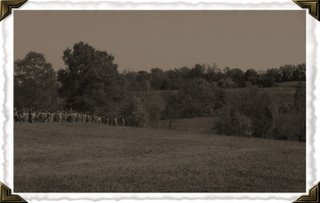

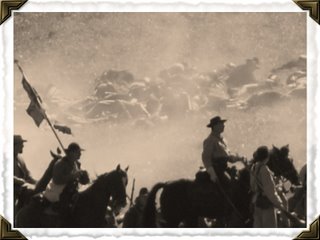

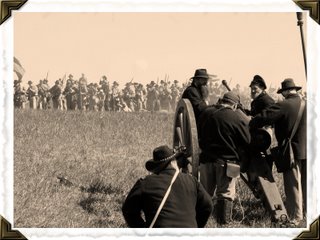
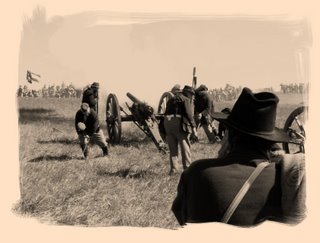

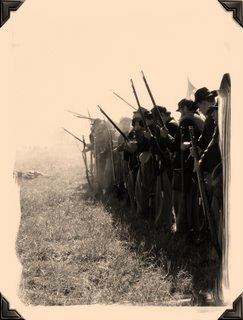
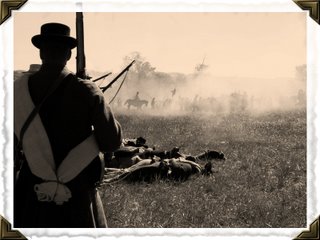
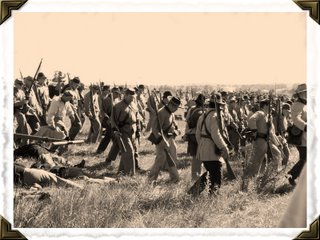
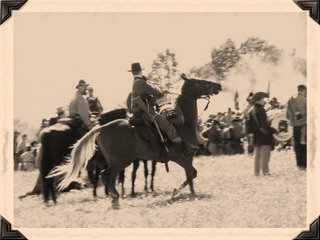
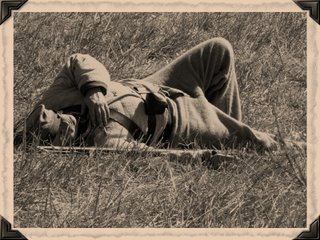
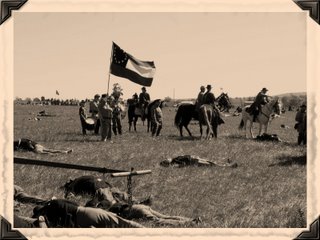
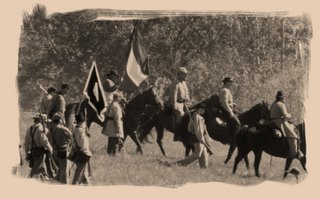
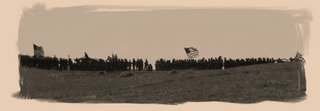
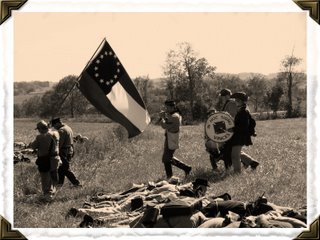

Union Account of the Battle of Perryville
On the Battle-Field, October 9, 1862.
Dear Friends:
Two days more heavy marching, almost without water, and with very short rations, brought us within seven miles of the fight. Yesterday morning we marched on. Such roads, -- so hilly and stony, and so tired we could hardly wag! At the edge of the field we halted for orders. Water, water, water! was the cry. Thoroughly exhausted, and famishing for food, as well as water, had we been well drilled we were in no state to do ourselves or our cause justice in the battle now ranging. I lay down, resolving to rest a little if possible. Some were detailed for water, but soon returned with empty canteens. "It must be reserved for the wounded." The lieutenant rose and said "We must have some, who will go?" I thought a moment, then with mess-pans and canteens three of us started after him. On and on we went, for two miles; the road became terrific, we must hurry for our regiment may be getting in. At length we found water, and hurried back. Such hills I never saw. I felt no excitement, but so tired. From the top of a hill we saw the fight at this moment. These few words no one can realize except they behold the reality. We hurried on, and shortly met the poor wounded ones coming out. I gave each a few drops, and hastened on to find my own regiment. On a steep, high hill I say troops, and thought I heard "21st Wisconsin." I scrambled up the hill; I was right. Our poor boys had been in. They lay in a cornfield, and the rebels came on within twenty feet, when the orders were given to "Fire and charge." But no order was heard. They saw the rebels were on them, and fired as well as they could. The bullets flew in showers. The battle raged during the afternoon, but the field was so hilly we could not know the result. At sunset the flashes sent a glare over the scene. Soon we were ordered to go to the regiment. What was my surprise to find only twenty out of at least sixty of our company who went in. The rebels held the ground where our dead and wounded lay. We lay down again on a hill at the foot of which the rebels were, and dropped asleep. Soon we were moved, and again we went silently, and drew off a batter, and lay down. The captain said, "Who will volunteer to carry off the dead?" Four or five of us started, laying off our arms, and carrying a handkerchief tied to a stick, for flag of truce.
We found our poor major dead and stripped. Oh, I loved him! What a loss to us! Others were dead, and many wounded; I helped carry off four, and then gave out from exhaustion. This is a strange word for me, but no other express it. The moon shone full upon the scene; it is utterly useless to describe the sight, --men and horses dead and wounded, wagon-wheels, army caissons scattered, and the moans and shrieks of the wounded. Oh, may you never see such a sight! I helped carry off one poor fellow with his mouth and lower jaw shot off-stop, stop! I can't say more. We slept till sunrise; I expected to see it rise for the last time, for I supposed at daylight we should pitch in till death or victory were ours; but no, the rebels had fled. We moved on two or three miles, and rest yet. Thank God, we have water! Of our squad only two remain well; Company C, on our left, has no officers left. This morning the loss averaged thirty-five, --quite a reduction. Our colonel has an arm broken, and a wound in the neck. Many were the hairbreadth escapes. The poor horses have had nothing all day except a little water.
Thirty-three of our regiment were trenched; no coffin or mark, except a rail or stone. Our major, noble man! Was among the number, --no sheet nor shroud, not even a coat, for he was striped. If I had the dearest friend killed in battle, I could only bury him. You can not realize our situation. The people flee because their houses are used for hospitals.
. . . It seems hard to throw men all in together and heap earth upon them, but it is far better than to have them lie moldering in the sun. Oh! To see the dead rebels in the woods! From one point I counted thirty-one, in a fence corner twenty-four; every where the eye rests on one, and this is not on the field proper. In our short march we passed at least two hundred, and of horses I made no count. It is a fearful sight; and to think of all these soldiers friends who would give any thing for their bloated, decaying bodies, now torn by swine and crows, --oh, it is sad!
Sgt. Mead Holmes, Jr.
Co. K, 21st Wisconsin Volunteer Infantry
[From: A Soldier of the Cumberland: Memoir of Mead Holmes, Jr. (Boston: American Tract Society), 1864, pp. 92-96.]
One final note that had Michael and I chuckling. When you arrive in Perryville, you slowly make your way through town and are directed to park in a huge open field. From there, you walk a bit and then catch a school bus that takes you to the battlefield. Now, on the bus... and I am not making this up, a woman was telling her children how cool this was going to be... how the pilgrims fought here... silence then followed on the bus.... yep... the pilgrims fought in the Civil War.... you heard it here first...
For more interesting and comprehensive information please go to:
Perryville Re-enactment
Battle of Perryville
Danville, Kentucky
Blogs and Links to Check Out This Week:
Dakotaranger - I just started recently visiting this guy- he is a regular at Kimosabe's. Good stuff, interesting insight.
Dragon Lady's World - I first saw this chick hanging out over at Diane's. I finally went to visit her... there I found out what I am known as in the blogosphere... you know... average of 30 visitors a day, but considered a Large Mammal in theTLLB...
Anna Venger - The name alone should get your attention.
NYC Taxi Shots & NYC Taxi Shots Camera Phone Photos - This is a taxi cab driver in New York City and takes some wonderful and artistic photos. I love his perspective.
Have a great week everyone!
No comments:
Post a Comment